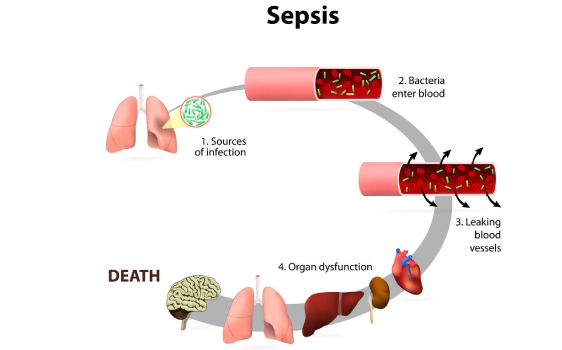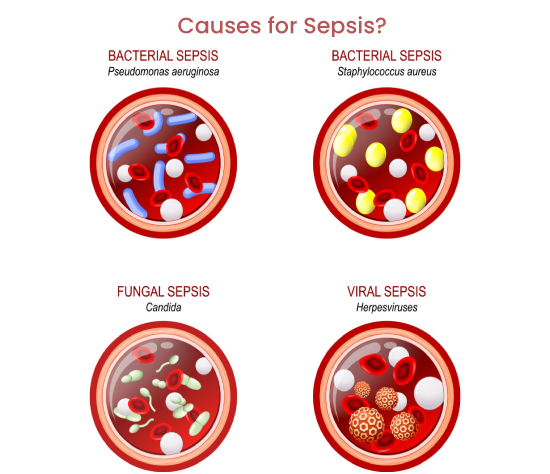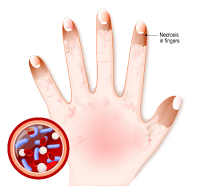Best Sepsis treatment in kukatpally
You accidentally cut your finger, and a few days later, you find yourself convulsing in severe pain in the abdomen. You keep yourself assured it is only a digestive problem and wish that it goes away. Hours pass by, but there is no relief even after ingesting few Antacid tablets. Then it’s time you need to understand it is more than an indigestion issue and rush to Anupama Hospital immediately. This can be a typical case of Sepsis, an emergency where the paramount concern should be quick diagnosis and prompt treatment.

What is Sepsis?
It is a life-threatening condition triggered by an autoimmune condition. When an infection activates the body’s immune system, the overactive immune system affects the body’s healthy body organs. It can cause inflammation throughout the body with accompanying conditions like reduced blood flow to limbs and vital organs. It can cause organ failure and is considered a life-threatening condition.
Over 90,000 people die every year because of Sepsis. People with chronic conditions like neurological disease, cancer, chronic lung disease, and kidney disease are more vulnerable to Sepsis. Mild Sepsis is easy to treat, while the mortality rate for septic shock is about 40%. In severe cases, it can lead to septic shock, where blood pressure drops drastically, leading to multiple organ failures. Moreover, the infection puts you at a higher risk of future diseases.
Symptoms of Sepsis
Symptoms vary from person to person and the source of infection. Sometimes it is hard to identify because there are many symptoms related to Sepsis. Unless identified early, the risk of preventing it from damaging the vital parts of the body is impossible. Therefore, whenever you notice any deviation from a normal function of the body after undergoing treatment or surgery, immediately visit Anupama Hospital for a good diagnosis and treatment.
- Discolored skin, blotchy and pale skin
- Confusion, slurred speech, not making sense of what you speak
- Difficulty in breathing
- Less than normal urination
- Fever, chills, and shallow temperature
- Nausea and vomiting
The symptoms in children and people with certain mental illnesses are difficult to identify.
If you have a baby, please keep a watch on the below symptoms.
- Fever or low temperature (in case of infants and newborns)
- Cold hands and feet
- Clammy and pale skin
- Shortness of breath
- Fast heart rate
- A high-pitched cry that differs from their usual cry
- Being sleepier than normal or difficult to awake
- Haven’t peed in the last 12 hours

What are the causes for Sepsis?
Though the exact reason is unknown, why the immune system causes the symptoms, we can attribute the reasons for immunity malfunctioning to viruses, fungi, and bacteria. Usually, Sepsis starts from the kidneys, lungs, and abdomen and spreads to other parts of the body. It is also possible to develop Sepsis through an injury or surgical incision that gets infected or contract it from hospitalization.

Risk Factors
Though infection is the primary factor for Sepsis, many other factors contribute. Aged people, children, and people with certain mental illnesses are more prone to infections than ordinary people. People with underlying health conditions such as diabetes, chronic kidney and liver diseases, and severely compromised immune systems are vulnerable to Sepsis than healthy people. Hospital stays, particularly in ICUs, exposure to invasive devices like catheters and breathing tubes, antibiotics, and corticosteroids are also critical risk factors in the spread of Sepsis.
Is Sepsis contagious?
The answer is no. Sepsis doesn’t transmit from person to person by contact or any external medium. Sepsis is not an infection per se but a response to an infection. Therefore, the underlying cause that is responsible for the condition is contagious. By taking preventive measures for infections, you can save yourself from Sepsis.
What is the diagnosis process?
When doctors suspect a case of Sepsis, they run a battery of tests that include a blood test to identify severe blood infection, along with other tests. Through these tests, they can pinpoint the cause of the condition and the organs infected.
What is the Treatment for Sepsis?
Antibiotics account for the primary line of treatment for Sepsis. As soon as doctors conclude it is Sepsis, they treat the patients with antibiotics to reduce the infection. Besides, they may administer IV fluids, oxygen when required, steroids to control inflammation, blood transfusion, etc.
sepsis treatment in kukatpally
Can Sepsis be prevented?
Preventing Sepsis is possible provided you take few preventive measures.
Get vaccinated against flu and pneumonia
Maintain hygiene to the possible extent. Do not expose your wounds as they might cause infection.
If you suspect any significant sign of Sepsis, immediately consult your physician to prevent complications






